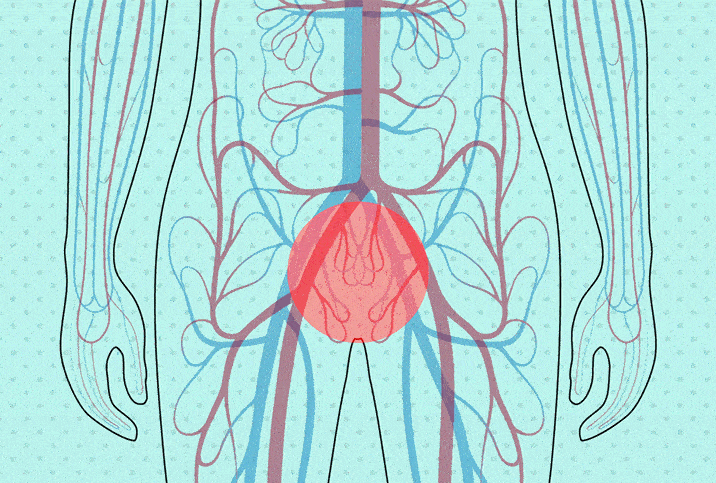Lymphangiosclerosis: Symptoms and Causes of That Hard Penile Vein

Hopefully, you're taking note of any new changes to the appearance of your penis. Notice a new bulging vein? It could be lymphangiosclerosis, or sclerosing lymphangitis, an uncommon condition where a lymph vessel connected to a vein in the penis becomes hard and swollen.
What is lymphangiosclerosis?
Lymph vessels carry lymph, a fluid that contains many white blood cells, throughout the body to help fight infections. The affected vessel feels hard when touched, even when the penis is flaccid, and becomes more prominent during an erection. Lymphangiosclerosis happens below the head, or glans, of the penis and has a rope- or cord-like appearance.
Most common among sexually active men in their 20s and 30s, the condition is not serious and should go away on its own. However, the swelling associated with lymphangiosclerosis may make some men self-conscious or anxious and less likely to have sex.
What are the symptoms of lymphangiosclerosis?
Keep in mind that a veiny penis is normal and not something you should panic about. However, in the case of lymphangiosclerosis, the bulge will appear larger than a typical vein and will usually be the color of your skin as opposed to the red or purple of a penile vein. The condition is typically benign, which means it will cause very little or no pain and discomfort.
'The bulge will likely resolve itself within a few weeks. While you're waiting for it to go away, you may want to have sex more gently and use additional lubrication—ditto for masturbation.'
The bulge is usually an inch or less in width, firm to the touch and does not disappear under the skin when the penis is flaccid.
Lymphangiosclerosis may be associated with an underlyingsexually transmitted infection (STI), such as syphilis, and you might have the following symptoms:
- Pain or burning when you urinate or ejaculate
- Pain in your lower abdomen or back
- Discharge from the penis
- Swelling of the testicles
- Itchiness or irritation on the penis, scrotum, thighs or anus
- Fever
- Fatigue
To diagnose lymphangiosclerosis, a physical examination is usually involved. Doctors may order bloodwork to check for antibodies or a high white blood cell count, which are signs of an infection. They may also take a small tissue sample from nearby skin to rule out other conditions, including skin conditions, or take a urine sample to check for signs of an STI. A swab test or Doppler ultrasound are other diagnostic tools used to rule out other issues.
What causes lymphangiosclerosis?
The cause of lymphangiosclerosis is not known, though doctors think that perhaps prolonged or frequent vigorous sexual activity or masturbation may be to blame. The micro-trauma from sex and masturbation may lead to obstruction of a large lymphatic vessel that's connected to a vein in the penis, causing thickening and hardening.
This condition usually develops within several days after sexual activity or masturbation. If you've been flying solo a lot lately, maybe it's time to shake up your masturbation game so you can avoid "death-grip syndrome," which can potentially lead to penis injuries.
How do you treat lymphangiosclerosis?
If you have lymphangiosclerosis but a typical sex life otherwise, you don't need to worry. If the condition is not associated with an STI, the bulge will likely resolve itself within a few weeks. While you're waiting for it to go away, you may want to have sex more gently and use additional lubrication—ditto for masturbation.
If you experience symptoms such as burning when you urinate, you should get tested for an STI. If the test comes back positive, you'll start a round of antibiotics. Remember to refrain from sex until you've finished the full course of antibiotics because you don't want to pass the STI on to partners.
While surgery is not typically needed to treat lymphangiosclerosis, a doctor might recommend surgically removing the lymph vessel if it continues to harden and swell. Again, lymphangiosclerosis is usually nothing to be concerned about. But when in doubt, schedule an appointment with your doctor or a urologist because peace of mind may well be worth the effort.


















